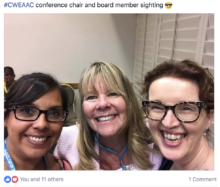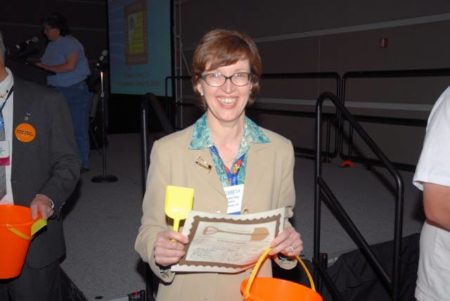As she retires, CWEA executive director Elizabeth Allan points with pride to the many achievements of the organization during her 17 years serving as the leader of the association’s professional staff.
 But it’s the people and the professional relationships she’s built that she will miss most once she leaves this spring.
But it’s the people and the professional relationships she’s built that she will miss most once she leaves this spring.
“We have great volunteers, smart members and an excellent staff,” she says. “I’ve benefitted from the knowledge-sharing and the problem-solving spirit within this organization. Having to say goodbye will be bittersweet.”
Allan had no experience with water or wastewater when she joined CWEA in 2002, although she was familiar with the organizational issues, having worked in association management since 1978.
She says she learned the value of clean water quickly – or rather the process involved in cleaning the water – by visiting sites, and through mentorship from people like Denis Pollak, who was CWEA president when she came on board.
“I was fascinated by the technology, and the fact that it wasn’t all mechanical; much of it was biological,” she remembers. “It was a new world to me.”
She quickly came to realize that CWEA members were the ones protecting public health and safety by keeping our water clean. “I now refer to them as our first line of environmental defense,” she says.
 And while clean water has remained the association’s mission over the years, Allan recalls the many changes and accomplishments she’s witnessed.
And while clean water has remained the association’s mission over the years, Allan recalls the many changes and accomplishments she’s witnessed.
“We added members (up more than 40% since 2002) and staff (from 8 to 18), and the number of CWEA certificate holders has increased dramatically,” she says. “Plus, it’s the pace or rate of change that’s increased, as well…new technologies, climate issues, regulations, the economy, drought, the concept of One Water.”
Allan is particularly proud of the association’s response to SSS WDR (Waste Discharge Requirements) for collections systems—a development that the collection systems community calls as important as the Clean Water Act. The Advanced Wastewater Treatment Operator certification, developed in partnership with AWWA’s California-Nevada Section, is also high on her list of the association’s achievements.
She’s overseen the establishment of the association’s Association Management System database, and applauds the growing strength of CWEA’s Local Sections and the racial and gender diversity within the organization and on its board of directors – and she chuckles at the development of computer technology. “I recall when we had difficulty hooking up with conference calls,” she says. “Now everyone’s on mobile devices.”
Those planning to retire are always asked what their plans are. Allan says she wants to get back to her neighborhood in Napa and spend more time with her husband, Jim. He received a new kidney recently and she participated through a “paired exchange program,” giving one of hers to another patient in need.
“It was a transformative experience and we both realize we’re the healthiest we’re going to be. We want to spend more time with each other,” she says.
She has no worries about the association. “We’re 90 years strong, and the new executive director will have a terrific staff and a great base of committed volunteers to bring CWEA to the next level of success and service.”
A small tip of advice for her replacement: “It would be helpful if that person had a cheat sheet listing all the water sector acronyms!”